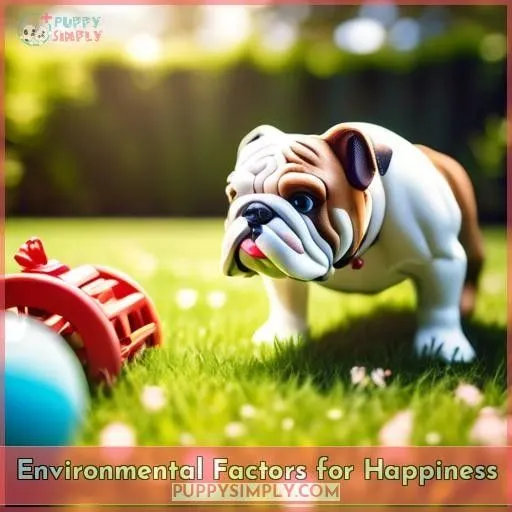This site is supported by our readers. We may earn a commission, at no cost to you, if you purchase through links.
You’ll know your bulldog is happy by their soft, relaxed eye contact, healthy appetite, good behavior on walks, and a wagging tail and body – often accompanied by adoring gazes at you.
Providing regular exercise, mental stimulation through puzzle toys and training, and a balanced diet fuel their physical needs for happiness.
Emotionally, they thrive on quality time, a safe environment, and meaningful interactions with you.
Establishing a routine with appropriate outlets like social play supports their happiness too.
Master these needs, and you’ll discover the key to a joyful bulldog companion.
Table Of Contents
Key Takeaways
- Soft, relaxed eye contact, a healthy appetite, good behavior on walks, and adoring gazes are signs of a happy bulldog.
- Regular exercise, mental stimulation through puzzle toys and training, and a balanced diet are essential for a bulldog’s physical needs.
- Quality time, a safe environment, and meaningful interactions with their owner emotionally fulfill a bulldog.
- Establishing a routine with appropriate outlets like social play supports a bulldog’s happiness.
Signs of Happiness
Your bulldog’s happiness is a beautiful thing to behold. When you see soft, relaxed eye contact, a healthy appetite, good behavior on walks, a wagging tail and body, and those adoring gazes, you can be sure your furry friend is content and joyful.
Soft, Relaxed Eye Contact
Your bulldog’s soft, relaxed eye contact is a clear sign of happiness.
When your furry friend gazes lovingly at you, it’s a signal of a calm demeanor and trusting behavior. This contentment signals that your dog is happy, healthy, and well-cared for.
Keep an eye on these signs to make sure your bulldog is thriving.
Healthy Appetite
Keep your Bulldog’s appetite healthy and happy by providing them with the right food and dietary supplements. Here are three ways to guarantee your Bulldog’s appetite stays on track:
- Choose the right dog food: Select a high-quality dog food that meets your Bulldog’s nutritional needs.
- Consider dietary supplements: Add supplements like probiotics or prebiotics to aid digestive health.
- Experiment with dog recipes: Try new recipes to keep mealtime exciting and arouse their appetite. Remember, a healthy appetite is a sign of a happy Bulldog!
Good Behavior on Walks
Just like a healthy appetite signals joy, so does good behavior on walks.
When your bulldog masters obedient leash training and showcases socialized walking etiquette, it’s a clear sign of happiness.
Controlled reactivity and off-leash freedom allow them to safely explore new environments, turning every walk into an adventure.
This not only keeps them happy but also mentally stimulated and physically fit.
This also ensures their well-being and happiness.
Wagging Tail and Body
Your bulldog’s wagging tail and body language can be a clear sign of their joy.
Look for expressive wagging patterns, as a relaxed, side-to-side motion often indicates happiness.
Canine joy is often reflected in a wagging tail that moves from side to side, with the body following suit.
Adoring Gazes
Your bulldog’s adoring gazes are a clear sign of happiness.
When they hold your gaze, it’s like they’re saying, I’m all yours.
This mutual gazing is a form of communication between you and your furry friend.
It’s a way for them to express their love and trust.
So, next time your bulldog gives you those puppy eyes, return the favor with a loving gaze.
It’s a simple act that can strengthen your bond and make both of you feel happy.
Physical Needs for Happiness
Meeting your bulldog’s physical needs is essential for their well-being. You’ll want to make sure they get regular exercise, both for physical and mental stimulation, and provide a balanced diet designed to meet their breed, age, and activity level.
Regular Exercise
Regular exercise is essential for your bulldog’s well-being.
Strive for at least 30 minutes of exercise each day, with a combination of low-impact activities like walks, brief runs, or swimming.
Alter the exercise frequency, duration, and intensity to keep your bulldog interested.
Select a secure and suitable exercise location, such as a dog park or your backyard.
Exercise not only keeps your bulldog physically healthy but also mentally engaged and happy.
Offer Mental Stimulation
- Puzzle toys that challenge and reward.
- Obedience training for brainy bonding.
- Scent work to sniff out fun and friends.
Keep it playful and watch their happiness soar!
Fuel With a Balanced Diet
Nourishing your Bulldog with a well-rounded diet is vital for their well-being. Comprehending their dietary needs is essential. Envision dietary supplements if warranted. Home-prepared meals can be advantageous, but be mindful of possible food sensitivities. Weight management is also significant. Bear in mind, a well-nourished Bulldog is a contented Bulldog.
Emotional Needs for Happiness
You can fulfill a bulldog’s emotional needs for happiness by giving quality time and attention. Providing a safe, comfortable environment where your furry pal feels secure and at ease is equally essential for their emotional well-being.
Give Quality Time and Attention
Give your Bulldog quality time and attention to strengthen your bond. Engage in meaningful interactions and shared experiences. Make sure your Bulldog feels loved and appreciated with undivided attention. These moments of mutual bonding will make your Bulldog feel secure and happy.
Maintain a Safe and Comfortable Environment
Maintaining a safe and comfortable environment is essential for your bulldog’s happiness. Provide a clean environment, ensuring ample water and fresh air. A cozy bed is essential, offering a safe space for your furry friend to rest and relax. By catering to these needs, you’ll create an environment where your bulldog feels secure and content, enhancing their overall well-being.
Environmental Factors for Happiness
To guarantee your bulldog’s happiness, you’ll want to provide a consistent routine and structure. This gives them a sense of security and helps meet their needs. Additionally, allow appropriate outlets for natural bulldog behaviors like chewing, digging, and playing. Meeting these innate needs prevents frustration and promotes contentment.
Provide a Routine and Structure
Provide a routine and structure for your Bulldog to guarantee their happiness. Here are three ways to do so:
- Exercise Routine: Establish a regular exercise routine that includes walks, playtime, and training sessions.
- Mental Stimulation: Offer mental stimulation through puzzle toys, scent games, and interactive play.
- Safe Environment: Create a safe and comfortable environment by keeping their living space clean and organized, and providing a secure outdoor area.
Allow for Appropriate Outlets for Natural Behaviors
To improve your bulldog’s well-being and happiness, it’s crucial to provide opportunities for their natural behaviors. Bulldogs, like many breeds, have unique needs that should be considered when enriching their environment. Here are some tips for facilitating your bulldog’s natural behaviors:
- Social Interactions: Bulldogs are renowned for their friendly and gentle nature, making them ideal family pets. Allow your bulldog to interact with other dogs and humans, but be mindful that some dogs may be less comfortable around strangers. Identify your dog’s preferred social interactions and make sure that any social enrichment activities are safe and enjoyable for them.
- Exploring and Interacting with the Environment: Bulldogs are naturally curious and love exploring their surroundings. Provide toys and objects that stimulate their hunting and searching instincts. This can minimize destructive behaviors and keep your dog mentally active.
- Chewing: Bulldogs have a strong urge to chew, which can reduce stress and anxiety. Offer suitable chew toys and treats to maintain your dog’s dental health and mental engagement.
- Physical Activity: While not as energetic as other breeds, bulldogs still require regular exercise for their physical and mental well-being. Engage your dog in brief walks or play sessions to help them burn energy and stay fit.
- Mental Stimulation: Puzzles and games can keep your bulldog mentally active and reduce boredom-related behaviors. Consider using food puzzles or interactive toys to provide mental stimulation and encourage problem-solving.
- Sensory Enrichment: Dogs have a keen sense of smell, which can be leveraged for enriching experiences. Scent games, like Noseworks or nose games, can expand your dog’s world and provide mental stimulation.
Enhancing Your Bulldog’s Happiness
As a bulldog owner, you know your furry friend’s wagging tail and adoring gaze are signs of pure joy.
But to truly enhance your bulldog’s happiness, you’ll need to prioritize quality time together, plenty of exercise and mental stimulation, and a nutritious, balanced diet designed for their breed’s needs.
By meeting these essential requirements, you’ll nurture a deep bond with your beloved companion and guarantee they live their most joyful, healthiest life.
Spend Quality Time With Your Bulldog
Spending quality time with your Bulldog isn’t just about filling the silence; it’s about creating moments that forge an unbreakable bond. Think of it as the secret sauce to a wagging tail of happiness.
- Engage in affectionate cuddling sessions that speak volumes without a word.
- Share experiences that build loyalty and companionship.
- Celebrate the joy of simply being together, reinforcing the bond of affection.
Provide Regular Exercise and Mental Stimulation
To guarantee your Bulldog’s contentment, it’s paramount to furnish frequent exercise and cerebral stimulation. Exercise regularity should be customized to your dog’s unique requirements, but a general recommendation is a pair of strolls per day, each enduring for approximately 10 minutes. Intermix other pursuits throughout the day to maintain your Bulldog’s engagement and stave off ennui.
Mental stimulation can be attained through diverse types of enrichment activities. These could include puzzle playthings, olfactory games, or even tutoring sessions. Rewarding your Bulldog with tidbits and acclaim during tutoring will assist in reinforcing constructive behaviors and motivating them to participate in these activities.
Socialization chances are also critical for your Bulldog’s contentment. Gradually familiarize your dog with dissimilar surroundings, people, and other creatures to aid in their becoming well-adjusted and confident in diverse social circumstances. This can be achieved through playdates with other dogs, visits to dog-friendly parks or cafes, or registering your Bulldog in puppy classes.
Fuel Your Bulldog With a Balanced Diet
As a conscientious and affectionate Bulldog owner, you recognize the significance of providing your canine companion with a balanced diet that fulfills their distinctive nutritional demands. Bulldogs possess specific dietary prerequisites, and selecting a premium dog food that caters to these prerequisites is imperative. Seek formulas that incorporate animal protein sources, such as lamb, fish, or beef, which furnish the optimal amino acid ratio and superior digestibility.
To safeguard your Bulldog’s digestive well-being, adhere to a consistent feeding schedule and practice portion control. Divide their daily food intake into two or three smaller meals, rather than feeding them a single large meal. This approach aids in preventing bloat, which can be a prevalent problem in Bulldogs due to their profound chests.
It is also paramount to avoid any foods that may trigger allergic reactions. Many Bulldogs exhibit allergies to chicken, so it’s prudent to refrain from chicken-based foods. Common allergenic foods for dogs include grains (wheat, corn, or soy), dairy products, and certain proteins. Should you suspect your Bulldog has a food allergy, consult with your veterinarian to ascertain the most effective elimination diet or alternative food choices for your beloved companion.
Conclusion
Bulldogs’ lively spirits may sometimes seem at odds with their sturdy frames.
By meeting their needs, you’ll witness pure joy.
When you spot that wagging tail, relaxed gaze, and healthy appetite, you’ll know your bulldog is happy.
Nurture their emotional and physical well-being through quality time, exercise, and a balanced diet.
You’ll be rewarded with an adoring, content companion.












